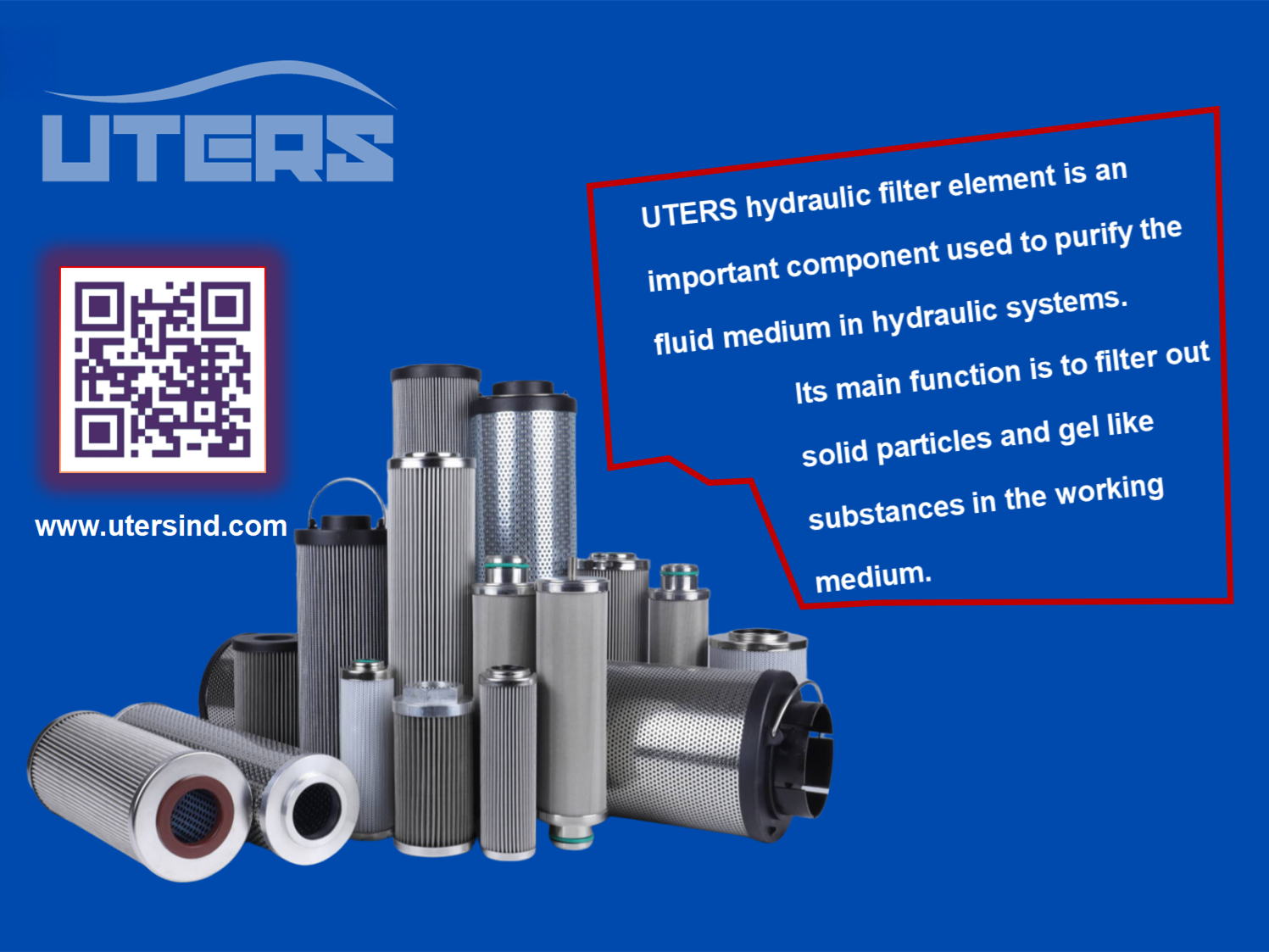Welcome to the official website of Henan Uters Industrial Technology Co., Ltd!
E-mail: sales@utersind.com Telephone: +86 18903897260(Whatsapp)
-
-
UTERS Replacement Filter Element & OEM
-
Replace of HYDAC filter element
-
Replace of PALL filter element
-
Replace of PARKER filter element
-
Replace of EATON / INTERNORMEN filter element
-
Replace of INDUFIL filter element
-
Replace of VOKES filter element
-
Replace of VICKERS filter element
-
Replace of HUSKY filter element
-
Replace of ARGO filter element
-
Replace of FG / MAHLE filter element
-
Replace of HILCO filter element
-
Replace of FILTREC filter element
-
Replace of MP-FILTRI Emerald filter element
-
Replace of STAUFF Sidford filter element
-
Replace of SOFIMA filter element
-
Replace of TAISEI KOGYO filter element
-
Replace of BOSCH REXROTH filter element
-
Replace of DONALDSON filter element
-
Replace of SCHROEDER filter element
-
Replace of EPPENSTEINER / EPE filter element
-
Replace of MOOG filter element
-
Replace of HY-PRO filter element
-
Replace of BOLL & KIRCH filter element
-
Replace of JIANGXI 707 RESEARCH INSTITUTE flter element
-
Replace of LEEMIN filter element
-
Replace of GENERAL ELECTRIC flter element
-
Replace of CJC fiter element
-
Replace of FLUIDTECH fiter element
-
Replace of OMT filter element
-
Replace of DOLLINGER fiter element
-
Replace of IKRON fiter element
-
Replace of HAGGLUNDS fiter element
-
Replace of FAIREY ARLON filter element
-
Replace of UFI filter element
-
Replace of NORMAN filter element
-
Replace of BUSCH fiter element
-
Replace of OEM & UTERS other replacement hydraulic filter element
-
Industrial factory filter element
-
-
Coalescer & Separator Cartridges
-
Replace of PALL filter element
-
Replace of BEA filter element
-
Replace of PARKER filter element
-
Replace of VOTECH filter element
-
Replace of PECO filter element
-
Replace of PETROGAS filter element
-
Replace of FRANK filter element
-
Other
-
-
Air Filtration & Purification
-
Air dust filter element
-
Primary/ medium/ high efficiency filter
-
Air filter bag
-
Plate & frame air filter element
-
Air filter
-
UTERS air filter element
-
-
Water Treatment Filter Element
-
Large flow filter element
-
Phenolic resin filter element
-
PP meltblown filter element
-
Folding filter element
-
Pool filter element
-
Wire-wound filter element
-
Activated carbon filter element
-
Mechanical filter
-
Precision filter
-
Bag filter
-
High flow fiter
-
Basket fiter
-
Water filter bag
-
-
Stainless Steel Filter Element
-
Melt filter element
-
Sintered filter element
-
Miniature valve body filter element
-
Non-standard customization filter element
-
Adhesive process filter element
-
-
Oil Purifier
-
Portable oil filter BLYJ series
-
Pop-moving oil filter LYC-A series
-
High precision oil filter LYC-B series
-
Box-type mobile oil filter LYC-C series
-
High viscosity oil filter GLYC series
-
Coalescence dehydration oil filter LYC-J series
-
PALL oil filter series
-
HYDAC oil filter series
-
LEEMIN oil filter LUC series
-
High efficiency vacuum oil filter ZLYC series
-
-
Air compressor & Precision Filter Element
-
Hydraulic Filter Housing
-
Hydraulic Accessories
-
Detailed introduction of hydraulic filter element
Release time:
2025-10-11 15:48
Hydraulic filter element is an important component used to purify the fluid medium in hydraulic systems. Its main function is to filter out solid particles and gel like substances in the working medium, control pollution, protect the components in the hydraulic system, and ensure the normal operation of the system.
In the complex system of modern industry, hydraulic systems are like the "blood vessels" of machinery, delivering power and vitality. Hydraulic filters, on the other hand, serve as the loyal "guardians" of this precise "vascular" system, silently playing an indispensable and crucial role.
A hydraulic filter is essentially a core component in a hydraulic system used to purify the fluid medium. Its working principle is based on mechanisms such as screening, interception, and adsorption, which can efficiently filter out impurities mixed in the hydraulic oil, such as metal debris, dust particles, and gelatinous pollutants. Although these impurities are small, they can cause serious damage to precision components in the hydraulic system, such as pumps, valves, and cylinders, leading to failures such as wear, blockage, and leakage, and even causing the entire hydraulic system to paralyze. Hydraulic filters, with their strong filtering capacity, effectively control the pollution degree of the medium and ensure the stable operation of the system.
In terms of structure and types, hydraulic filters come in a rich variety. According to the installation position, they are divided into suction line filters, pressure line filters, and return line filters. The suction line filter is usually installed at the inlet of the hydraulic pump and is responsible for rough filtration to prevent large particles of impurities from entering the pump body; the pressure line filter is located in the pressure oil circuit after the outlet of the hydraulic pump to carry out fine filtration and protect the downstream precision components; the return line filter is installed in the return line to capture various impurities generated during the operation of the system and prevent them from circulating and polluting again. In addition, there are filters designed according to special functions, such as water-ethylene glycol medium filters and coalescing separation filters, to meet the needs of different working conditions. In terms of materials, common ones include stainless steel braided mesh, glass fiber, filter paper, etc., and different materials have their own characteristics in performance such as filtration accuracy, dirt holding capacity, temperature resistance, and pressure resistance.
Hydraulic filters are widely used in many fields. In the field of construction machinery, equipment such as excavators and loaders work frequently under harsh working conditions, and hydraulic filters ensure the normal operation of the hydraulic system in complex environments such as dust and soil; in automobile manufacturing, hydraulic systems are used in stamping, welding, and other links of the automated production line, and filters ensure the stable operation of the equipment and improve production efficiency and product quality; the aerospace field has extremely high requirements for the reliability of the hydraulic system, and high-precision hydraulic filters are an important guarantee for the safe flight of the aircraft hydraulic system; in the petrochemical industry, filters help hydraulic equipment work reliably in environments with high temperature, high pressure, and corrosive media.
In terms of performance parameters, filtration accuracy, working pressure, temperature resistance range, filtration ratio, and fatigue life are important indicators to measure the quality of hydraulic filters. Filtration accuracy determines the ability of the filter to intercept impurities—the smaller the value, the better the filtration effect; working pressure and temperature resistance range reflect the applicable working conditions of the filter; the filtration ratio reflects the filtration efficiency; and fatigue life is related to the durability of the filter. These parameters are interrelated. When selecting hydraulic filters, users need to comprehensively consider these parameters according to the requirements of the actual hydraulic system to ensure that the filter is perfectly adapted to the system.
At the same time, correct maintenance is crucial for the performance and service life of hydraulic filters. Regularly checking the pollution condition of the filter and replacing it according to the specified replacement cycle are the keys to ensuring the normal operation of the hydraulic system. When replacing the filter, strictly follow the operating procedures to prevent impurities from entering the system and ensure that the new filter is installed correctly and sealed well.
With the continuous development of industrial technology, hydraulic filters are also continuously innovating and upgrading. In the future, hydraulic filters with higher filtration accuracy, larger dirt holding capacity, and more energy conservation and environmental protection will continue to emerge, providing a more solid guarantee for the efficient and reliable operation of hydraulic systems and playing a more important role in the development of modern industry.

Recommended News
2025-10-12
Pro Tips for Extending the Lifespan of Your Air Filter Element
Pro Tips for Extending the Lifespan of Your Air Filter Element Table of Contents Understanding Air Filter Elements The Importance of Air Filters in Industrial Applications Common Factors Affecting the Lifespan of Air Filters Pro Tips for Extending Your Air Filter’s Lifespan Regular Maintenance Practices Optimal Installation Techniques C
2025-10-11
Detailed introduction of hydraulic filter element
Hydraulic filter element is an important component used to purify the fluid medium in hydraulic systems. Its main function is to filter out solid particles and gel like substances in the working medium, control pollution, protect the components in the hydraulic system, and ensure the normal operation of the system.
2025-10-10
UTERS PCHG Series filter elements are ideal for removing deformable and shear sensitive contaminants from natural gas streams. The elements are designed to fit PECO 75 Series and 85 Series vessels, as well as a variety of competitor filter separator vessels. Their synthetic construction makes them an environmentally friendly product and an excellent upgrade to traditional fiberglass filter elements.
2025-10-09
Role of Service Station Filter Elements in Optimizing Protective Filtration system
Fluid purity is critical for protecting sensitive equipment and ensuring process integrity in any large-scale industrial operation.
Telephone:
Whatsapp:
Skype:
E-mail:
All rights reserved © Henan Uters Industrial Technology Co., Ltd. has supported ipv6
SAF Coolest v1.3.1.2 设置面板 ZQUSX-AEXJ-TSSFE-ZVV
无数据提示
Sorry, the current column has no content for the time being.!
You can view other columns or return Home Page




